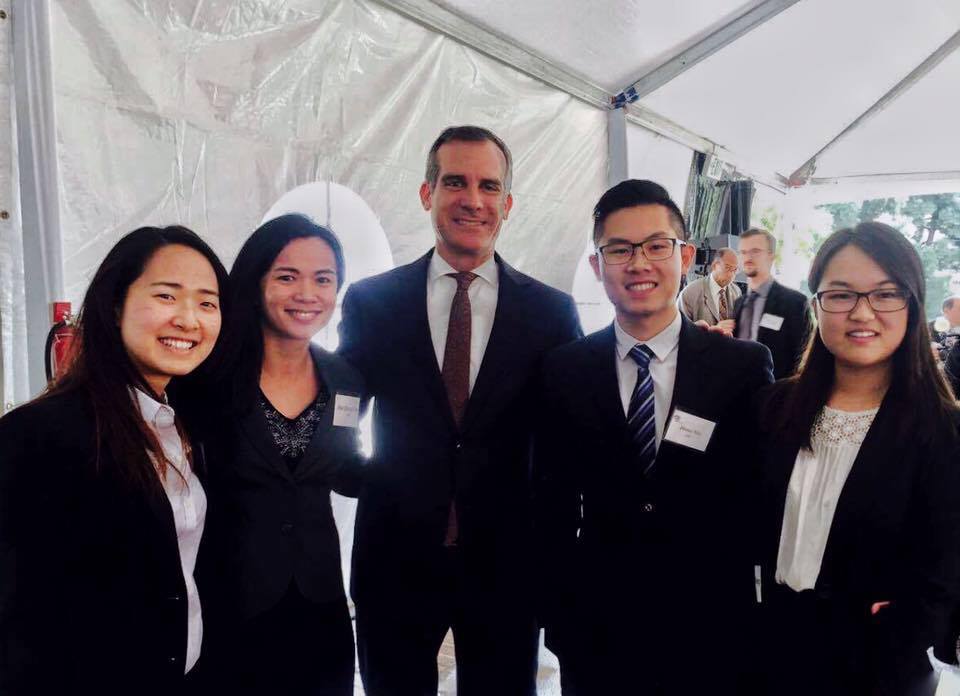News | USC Students Support 15th Mayoral Housing, Transportation, and Jobs Summit
Stop the VideoNews

METRANS UTC
USC Students Support 15th Mayoral Housing, Transportation, and Jobs Summit
Friday, November 18, 2016
by By Meiduo Ji, MPL 2018
On Oct 28, 2016, the Los Angeles Business Council (LABC) hosted its 15th Mayoral Housing, Transportation, and Jobs Summit at the University of California, Los Angeles. The summit was divided into three distinct sessions: “Addressing LA’s Housing Needs: Increasing Market Rate, Workforce and Affordable Housing Production in Los Angeles,” “The Future of Transportation in Los Angeles,” and “Is There a Future for Workforce Housing in California?”. Four USC graduate students, Jimmy Mai, Master of Civil Engineering – Transportation Engineering, Rui Zhang & Meiduo Ji, Master of Planning, Kaitlyn Zhang, Master of Public Policy, and a recent USC graduate, Wai Shong Chan, Master of Public Administration, volunteered at the summit. USC undergraduate student Sunghea Khil in Public Policy and development also attended the summit.
The second panel of the summit took a focus on the future mode of transportation and alternative mobility solutions. Phillip Washington, the CEO of Metro, framed the session about the future of transportation in Los Angeles. Phil Recht, partner of Mayer Brown LLP, was the moderator. Panelists included Shad Balch, Western Region Manager of Product & Public Policy Communications Chevrolet; Timothy Burr, Senior Public Policy Manager of Lyft; Stephen Polechronis, Senior Vice President of AECOM; Seleta Reynolds, General Manager of LADOT; and Nancy Sutley, Chief Sustainability & Economic Development Officer of LADWP. The panel mainly focused on five aspects of Measure M, the Los Angeles County Traffic Improvement plan: the latest developments in driverless vehicle technology; LADWP’s strategy for investing in electric vehicle infrastructure; leveraging growth opportunities for ride sharing and on-demand transportation; eliminating traffic death by 2050; and economic and environmental benefits of transforming our multi-modal transportation system. Washington also emphasized the potential of accelerating infrastructure projects through P3 (Private-Public Partnerships) cooperation, and added that Metro has received 8 proposals since they announced the acceptance of unsolicited proposals instead of issuing projects using the RFP (Request for Proposals) process. Polechronis highlighted the value of such a private-public relationship. By combining the expertise from the private sector and the leadership from the public sector, there is a better chance of finishing projects in lesser time and with better quality, he argued.
Alternative modes of transportation were also addressed by the panelists. Technology advancement from car makers, such as Chevrolet’s incorporation of green technology and rideshare programs, provide a new perspective on how future mobility can be, the panel noted. Chevrolet is currently working with car-share applications and techniques on how to make cars more environmental friendly. And Lyft is partnering with public agencies to provide integrated travel choices.

From left to right: Sunghea Khil, Wai Shong Chan, Mayor Eric Garcetti, Jimmy Mai, and Kaitlyn Zhang
(Photo provided by Wai Shong Chan)
During the lunch, Los Angeles Mayor Eric Garcetti spoke to the audience about the importance of Measure HHH and Measure M, upcoming initiatives at the the time of the conference. LABC also supports Measure M, a proposal that seeks to raise the countywide sales tax by a half-cent to pay for public transportation. Business council president Mary Leslie said:
“The fact that escalating home prices is hindering major employers from recruiting the best possible workforce raises serious concerns about our ability to maintain a diverse, vibrant economy. That’s why LABC supports passage of Propositions HHH and Measure M, because they have the power to increase our housing supply and create a modern transportation network to make our region more economically competitive.”
Both Measure M and Measure HHH together with many other transportation funding measures passed in California on November 8.
Meiduo Ji
Meiduo Ji is a first-year graduate student majoring Urban Planning at the USC Sol Price School of Public Policy. Her concentration is transportation planning and real estate. She also has a GIS and Map Design background. She can be reached at [email protected].
News Archive
- December (1)
- November (6)
- October (4)
- September (2)
- August (3)
- July (4)
- June (3)
- May (7)
- April (8)
- March (11)
- February (8)
- January (7)
- December (7)
- November (8)
- October (11)
- September (11)
- August (4)
- July (10)
- June (9)
- May (2)
- April (12)
- March (8)
- February (7)
- January (11)
- December (11)
- November (5)
- October (16)
- September (7)
- August (5)
- July (13)
- June (5)
- May (5)
- April (7)
- March (5)
- February (3)
- January (4)
- December (4)
- November (5)
- October (5)
- September (4)
- August (4)
- July (6)
- June (8)
- May (4)
- April (6)
- March (6)
- February (7)
- January (7)
- December (8)
- November (8)
- October (8)
- September (15)
- August (5)
- July (6)
- June (7)
- May (5)
- April (8)
- March (7)
- February (10)
- January (12)















